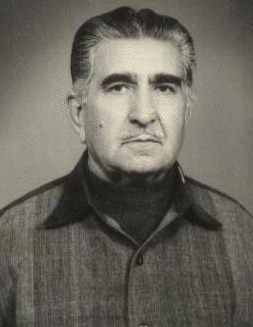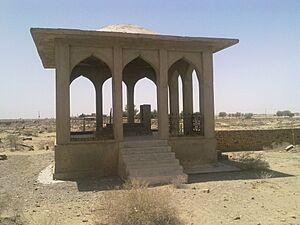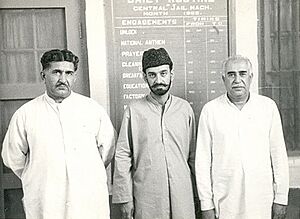Gul Khan Nasir facts for kids
Quick facts for kids
Mir
Gul Khan Naseer
|
|
|---|---|
 |
|
| 1st Education Minister of Balochistan | |
| In office 1 May 1972 – 13 February 1973 |
|
| Chief Minister | Ataullah Mengal |
| Preceded by | Office established |
| Succeeded by | Governor's rule for 2 months |
| Personal details | |
| Born | 14 May 1914 Noshki, Baluchistan, British India (present-day Balochistan, Pakistan) |
| Died | 6 December 1983 (aged 69) Karachi, Sindh, Pakistan |
| Political party | Usthman Gul, National Awami Party |
Gul Khan Naseer (Balochi:میر گل خان نصیر; Urdu: میر گل خان نصیر), also known as Malek o-Sho'arā Balochistan (Balochi:ملک شعراء بلوچستان; Urdu:ملک شعراء بلوچستان), was an important Pakistani politician, poet, historian, and journalist. He was born on May 14, 1914, and passed away on December 6, 1983. He came from Balochistan.
Most of his writings are in the Balochi language, but he also wrote in English, Urdu, Brahui, and Persian. He is remembered for his efforts to bring positive change to his region.
Contents
Early Life and Education
Gul Khan Nasir was born in 1914 in Noshki, a town in what was then British India. His family was Baloch and Muslim. His father was Habib Khan, and his mother was Bibi Hooran.
He started his schooling in his village. Later, he moved to Quetta to attend Government Sandeman High School. For higher education, he went to Islamia College Lahore in Lahore. However, he had to leave college early because of an eye injury.
Lahore was a very active city at that time, full of new ideas in politics, culture, and literature. These ideas greatly influenced Gul Khan Nasir. When he returned to Quetta, Balochistan was divided into different parts, some directly ruled by the British and others by local tribal chiefs. Nasir decided to enter politics. He wanted to end British rule and reduce the power of tribal chiefs in Balochistan.
Boxing and Sports
When Gul Khan Nasir was studying in Lahore, he joined the college football team. He also learned how to box. Boxing helped him a lot in tough situations during his life.
He took part in boxing competitions and was even the runner-up in the All India Universities Boxing Championship. During one of these matches, he broke his nose.
Fighting for People's Rights
After a political group called "Anjuman-e-Islamia Riyasat-e-Kalat" was banned, young politicians in Kalat formed a new group called the Kalat State National Party (KSNP) in 1937. Gul Khan Nasir became its vice president.
The KSNP worked to reduce the power of tribal chiefs (Sardars). They also fought to remove unfair taxes on poor people and wanted a democratically elected government, similar to the British Parliament. The party faced many challenges and its leaders, including Gul Khan Nasir, were often arrested.
Political Parties and Challenges
After Kalat joined Pakistan in 1948, the KSNP broke up. Gul Khan Nasir and his friends decided not to join the Muslim League, which was the ruling party.
In 1955, the western parts of Pakistan were combined into one large province called West Pakistan. To fight for their rights, politicians from Balochistan, including Gul Khan Nasir, formed a party called "Usthman Gal," which means "The People's Party" in Balochi.
Later, in 1956, "Usthman Gal" joined other parties from different regions to form the Pakistan National Party. This new party became a major left-wing political group in West Pakistan.
In 1957, the Pakistan National Party merged with another party to create the National Awami Party. This party became the main opposition against the military government in the late 1950s and 1960s.
Years of Imprisonment (1958-1970)
During the rule of Ayub Khan, many leaders of the National Awami Party, including Gul Khan Nasir, were arrested multiple times. They were held in places like Quetta's Quli Camp. Gul Khan Nasir was jailed about 5 or 6 times between 1962 and 1970.
During this time, new leaders like Sardar Ataullah Khan Mengal and Nawab Khair Bakhsh Marri became important in Balochistan's politics. The National Awami Party strongly opposed the government, and because of their efforts, the "One Unit" system was ended, and Balochistan became a separate province.
1970 Elections and Government
In the 1970 elections, the National Awami Party won most of the seats in Balochistan. Gul Khan Nasir won a seat in the Provincial Assembly.
After the elections, there was a lot of political tension, and East Pakistan became Bangladesh. Eventually, in 1972, the National Awami Party was allowed to form governments in Balochistan and another province.
In Balochistan, Sardar Ataullah Khan Mengal became the first Chief Minister, and Mir Ghaus Bakhsh Bizenjo became the Governor. Gul Khan Nasir served as a Senior Minister, looking after important areas like Education, Health, and Social Welfare. As Education Minister, he helped start the Bolan Medical College, which is still the only medical college in Balochistan.
However, the government faced challenges. Differences arose between the National Awami Party leaders and Nawab Akbar Khan Bugti. The government was dismissed, and Gul Khan Nasir was arrested along with other leaders in 1973. They were accused of treason in a case known as the Hyderabad Tribunal.
While in prison, the Baloch leaders had some disagreements. After the government of Bhutto was removed, negotiations led to the release of all political prisoners in 1979.
Later Political Life and Retirement
After their release, Gul Khan Nasir and Ghaus Bakhsh Bizenjo joined a new party called the National Democratic Party. Later, they formed their own party, the Pakistan National Party (PNP). Gul Khan Nasir became the president of the PNP in Balochistan.
Gul Khan Nasir believed that the people of Balochistan should be educated and prepared for the future, rather than constantly fighting the government. Eventually, he resigned from his political leadership roles to focus on his literary work.
Years in Prison
Gul Khan Nasir was arrested many times between 1939 and 1978 for his political activities. He spent a total of almost 15 years of his life in jail.
Literary Contributions
Gul Khan Nasir was a talented poet who wrote in English, Urdu, Balochi, Brahui, and Persian. Most of his poems are in Balochi. He was good friends with the famous poet Faiz Ahmed Faiz.
His Urdu poetry was mainly written between 1933 and 1950, but it has not been published yet.
Published Works (After His Death)
- Gulgaal (1993)
- Shanblaak (1996)
Awards and Recognition
In 2001, Gul Khan Nasir was given the Sitara-i-Imtiaz (President's Award) after his death, recognizing his important contributions to literature.
In 1962, the USSR government wanted to give him the Lenin Prize, but he was not allowed to travel to Moscow because of his disagreements with the government at that time.
Death
Soon after leaving his political role, Gul Khan Nasir's health got worse, and he was diagnosed with lung cancer. He did not have enough money for treatment and refused help from relatives.
When his condition became very serious, he was taken to Karachi. Doctors said he only had a few days left to live. He passed away on December 6, 1983, in Karachi. His body was taken back to his village, Noshki, in a large procession. He was buried there on December 7, 1983. Many people attended his funeral.

Archives
Five notebooks containing Gul Khan Nasir's Balochi poetry, written in his own handwriting, are kept at the SOAS Archives (MS 380635).
See also
- Balochi literature
- Nawab Akbar Bugti
- Habib Jalib
- Faiz Ahmed Faiz
- National Awami Party
- Ahmed Faraz
- Amir-ul-Mulk Mengal
- Khan Wali Khan
- Ataullah Mengal
 | Janet Taylor Pickett |
 | Synthia Saint James |
 | Howardena Pindell |
 | Faith Ringgold |


